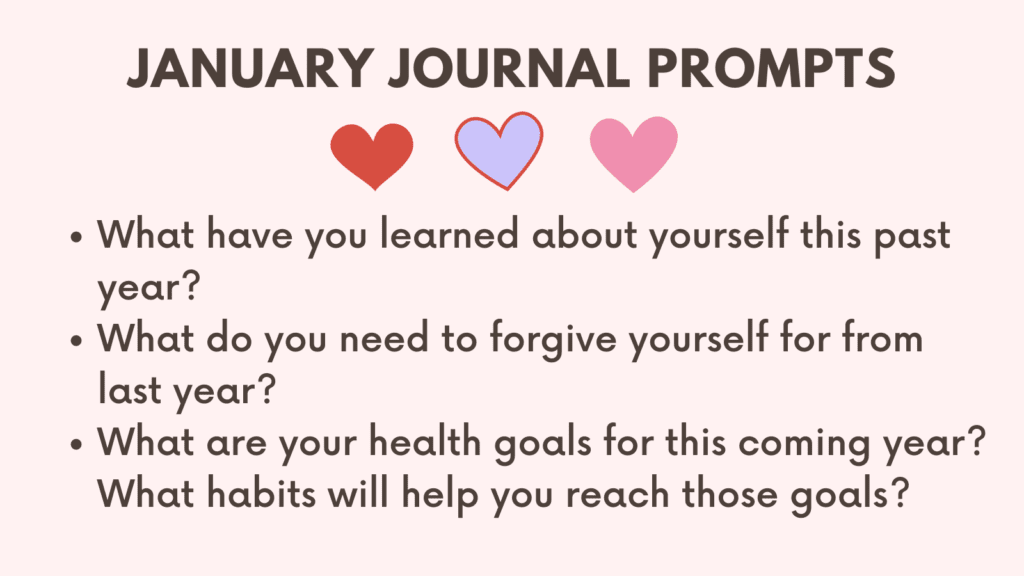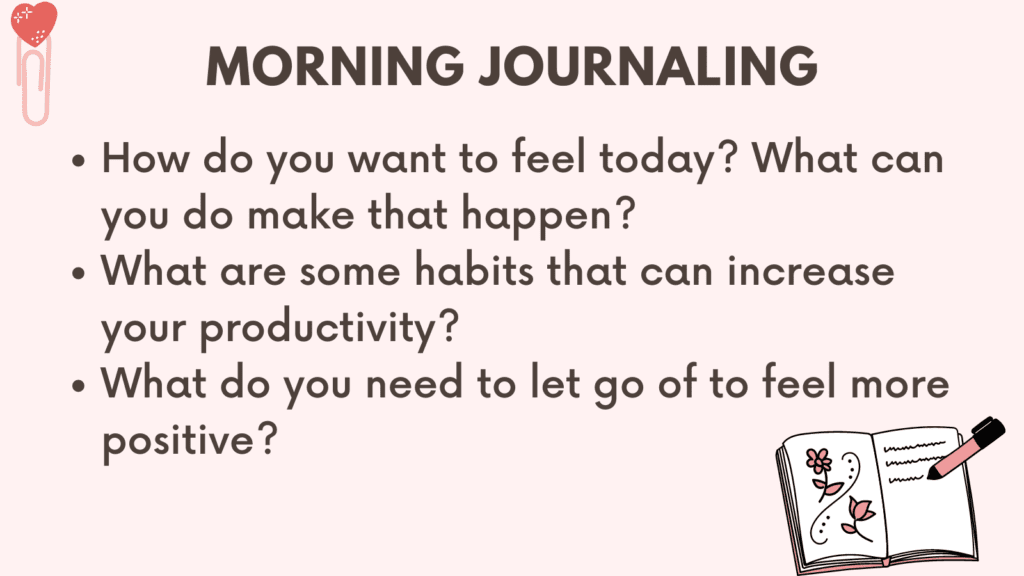This post contains some of the best January journal prompts to reflect and goal set for the new year.
What Are Journal Prompts?
Journal prompts are thought-provoking questions or suggestions that can inspire you to write in your journal.
These prompts can help you explore your thoughts, emotions, and experiences in a more focused and intentional way.
Journal prompts can be about a wide range of topics, such as gratitude, self-reflection, relationships, goal-setting, creativity, or personal growth.
By using journal prompts regularly, you can develop a deeper understanding of yourself, gain clarity on your values and priorities, and find new insights into your life.
January Journal Prompts
1. What accomplishments from last year are you proud of?
2. What are 3 lessons last year taught you?
3. What have you learned about yourself this past year?
4. What do you feel most grateful for from last year?
5. What habits and relationships do you need to leave behind from last year?
6. What do you need to forgive yourself for from last year?
7. What’s one thing you can look forward to this year?
8. What area of your life do you need to focus more on?
9. What good habits do you want to start this year?
Related: Top +100 Journal Prompts For Mental Health [+Free PDF Printable!]
10. What are your health goals for this coming year? What habits will help you reach those goals?
11. How do you feel about your current mental health? What can you do to improve it and become more resilient?
12. How do you plan on showing yourself more love and compassion this year?
13. What are you financial goals this year? What practices can you implement to help you reach your goals?
14. What new things do you want to try for this year that will push you out of your comfort zone?
15. Make a list of your current weaknesses. How can you change these?
16. How healthy are your relationships? What can you do to improve them?
Related: Top 21 Healing Journal Prompts To Support Your Healing Journey
17. What new skills do you want to learn this year?
18. What interests do you want to pursue this year?
19. What limiting beliefs do you have about yourself? How do you plan to change them?
20. What do you need to stop judging yourself and others for?
21. What change can you make that will make your life easier?
Related: Best 35 Journal Prompts To Get To Know Yourself
22. What causes or organizations would you like to support this month?
23. What is an embarrassing moment that you can’t seem to forget? Can you find compassion for yourself after reflecting on the situation?
24. What does your body need from you? More exercise? More water? Better sleep?
25. What has been stressing you out most lately? What can you do to relieve some of the stress?
26. Are social media a positive or negative influence for you? How can you make your social media feed more positive?
27. What’s on your mind right now? Let it flow without judgment.
28. What is something that makes you feel relaxed and calm? How can you do more of that?
29. What do you fear the most in life? How can you overcome those?
30. What’s a quote that best reflects your experience this month?
31. How would you describe this month in one word?
New Year’s Resolution Worksheet
Benefits of Using Journal Prompts
There are several benefits to using journal prompts, including:
1. Enhanced self-awareness: Journal prompts encourage introspection and reflection, helping you gain a deeper understanding of yourself, your thoughts, and emotions. They enable you to explore your beliefs, values, dreams, and fears in a structured and focused way.
2. Increased creativity: Journal prompts can serve as creative springboards, sparking new ideas and perspectives. They challenge you to think outside the box and venture into unexplored areas of your imagination. By consistently engaging with prompts, you can enhance your writing skills and unleash your creativity.
3. Emotional well-being: Writing about your emotions can be therapeutic. Journal prompts provide a safe space for expressing and processing your feelings, helping to reduce stress and anxiety. They enable you to release pent-up emotions and gain emotional clarity, leading to a sense of relief and improved mental well-being.
4. Improved problem-solving: Journal prompts can help you confront personal challenges or dilemmas by encouraging you to analyze situations from different angles. Through writing about problems and potential solutions, you stimulate critical thinking and develop problem-solving skills. This process allows you to gain insights and make decisions more effectively.
5. Goal setting and self-reflection: Journal prompts can guide you in setting goals, whether long-term or short-term. By exploring your aspirations, desires, and motivations, you can clarify your objectives and create actionable steps toward achieving them. Additionally, regularly journaling about your progress and reflecting on your experiences helps to track personal growth and development.
6. Stress reduction: Engaging with journal prompts can serve as a form of mindfulness practice, allowing you to focus on the present moment and detach from stressors. The act of writing itself can be calming and meditative, promoting relaxation and reducing anxiety.
Related: Top 25 Self-Reflection Journal Prompts
How to Use Journal Prompts?
Here’s a simple guide on how to use them:
1. Choose a prompt: Select a journal prompt that resonates with you or piques your interest. You can find prompts online, in books or come up with your own.
2. Set the scene: Find a quiet, comfortable space where you can focus without any distractions. Prepare your journal, pen, and any other materials you need.
3. Start writing: Begin by writing the prompt at the top of the page and then start freewriting. Write whatever comes to mind, without worrying about grammar, spelling or structure. Keep writing until you feel like you’ve exhausted everything you have to say about the topic.
4. Reflect: After you’ve finished writing, take a moment to reflect on what you’ve written. Ask yourself questions like, “What did I learn from this exercise?” or “How did this prompt make me feel?”
5. Repeat: Continue using different prompts on different days to explore different aspects of your life, emotions, and experiences.
Remember that journaling is a personal practice, so don’t be afraid to experiment and adjust the process to suit your needs.
The most important thing is to be honest with yourself and allow yourself to express your thoughts and feelings freely.
Related: Best 10 Self Discovery Books
Conclusion
Using journal prompts is a great way to kickstart your journaling practice and help you delve deeper into your thoughts and feelings.
Remember, journaling is a personal journey, and you can adapt the prompts to suit your needs and preferences.
Above all, enjoy the process and let your thoughts flow freely.



